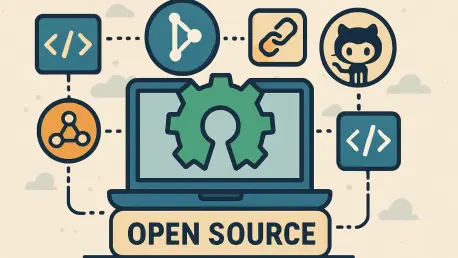In an era where digital landscapes are increasingly shaped by a handful of powerful entities, the push for equitable access to technology has never been more critical, especially as artificial intelligence (AI) becomes a cornerstone of innovation across industries. The concentration of control over AI systems and data in proprietary hands often sidelines marginalized communities, creating a digital divide that threatens global progress. Amid this challenge, a significant development has emerged with Mozilla, a long-standing advocate for an open internet, aligning with a United Nations-backed initiative to address these disparities. This partnership signals a bold step toward ensuring that technology, particularly AI, serves the public good rather than reinforcing existing inequalities. By joining forces with like-minded organizations, Mozilla aims to foster a future where open-source solutions drive inclusivity, transparency, and user empowerment on a global scale, setting a precedent for how technology can be harnessed for universal benefit.
Advancing Digital Equity Through Strategic Collaboration
The decision by Mozilla to join the Digital Public Goods Alliance (DPGA), a multi-stakeholder initiative supported by the United Nations, marks a pivotal moment in the fight for digital equity. This alliance focuses on promoting digital public goods—such as open-source software, open data, and accessible AI models—that align with the UN Sustainable Development Goals. Mozilla’s involvement underscores a growing recognition within the tech community that closed ecosystems often exclude vulnerable populations from the benefits of technological advancement. By participating in the DPGA, Mozilla is positioned to influence policies and practices that prioritize public interest over corporate dominance. This collaboration reflects a broader trend toward community-driven solutions, where transparency and accessibility become the foundation for innovation. The emphasis on shared resources aims to dismantle barriers, ensuring that advancements in AI and other digital tools are not reserved for a select few but are instead available to empower diverse global communities.
Furthermore, Mozilla’s commitment to the DPGA extends beyond mere participation, as it actively contributes to shaping the discourse around ethical technology development. A key aspect of this effort involves advocating for systems that respect user privacy and autonomy, countering the risks posed by data monopolies and opaque algorithms. The tech giant’s role in the alliance is not just symbolic; it includes tangible initiatives to support projects that embody open-source principles. By aligning with other stakeholders in the DPGA, Mozilla helps amplify the call for digital tools that are inclusive by design, addressing systemic issues that have long hindered equitable access. This strategic partnership also provides a platform to tackle pressing concerns about who controls AI, pushing for models that serve societal needs rather than profit-driven motives. Through this alliance, the groundwork is laid for a digital commons that benefits all, highlighting the urgent need for collaborative efforts in redefining the future of technology.
Innovating with Open-Source AI and User-Centric Tools
One of the standout contributions of Mozilla within the DPGA framework is its Common Voice project, a certified digital public good that exemplifies the power of open-source technology. This initiative has amassed a vast repository of multilingual voice data, collected with explicit user consent, and made freely available to developers creating speech recognition tools. Such efforts demonstrate how open resources can fuel innovation while maintaining ethical standards, ensuring that technology remains accessible to diverse populations. Unlike proprietary systems that often lock users into specific ecosystems, Common Voice empowers creators to build solutions tailored to local languages and needs, fostering inclusivity. Mozilla’s focus on projects like this within the DPGA highlights a commitment to breaking down linguistic and cultural barriers, making AI a tool for connection rather than exclusion, and setting a benchmark for how digital public goods can drive meaningful change.
In addition to data-driven projects, Mozilla is embedding user-focused AI features into its widely used Firefox browser, balancing innovation with transparency. Recent updates include functionalities like an AI chatbot sidebar and experimental tools that prioritize user control, avoiding the pitfalls of vendor lock-in or invasive algorithms. These developments reflect a nuanced approach to AI integration, ensuring that technological advancements enhance user experience without compromising autonomy. By championing such features, Mozilla addresses growing concerns about privacy and overreach in digital spaces, reinforcing the idea that technology should serve people first. This dedication to ethical AI within everyday tools complements the broader mission of the DPGA, showcasing practical applications of open-source principles. The emphasis on empowering users through accessible, transparent technology illustrates a forward-thinking strategy that could inspire similar efforts across the industry, reshaping how AI is perceived and utilized.
Building a Sustainable Future for Digital Commons
Looking ahead, Mozilla’s roadmap within the DPGA includes a multi-faceted approach to strengthen the digital commons, with plans to launch a grantmaking program in the fall to support community-driven tech initiatives. This funding effort aims to nurture public interest projects that prioritize long-term sustainability, ensuring that open-source solutions continue to thrive. Alongside this, advocacy and research will play a crucial role in highlighting the societal and economic benefits of open technologies, building a compelling case for their adoption on a wider scale. By supporting projects like Firefox and Common Voice, Mozilla seeks to create a robust ecosystem where innovation is not stifled by proprietary constraints. These efforts underscore the importance of collective action in addressing digital inequities, providing a model for how organizations can contribute to a shared vision of technology that benefits everyone, regardless of geographic or economic status.
Reflecting on the strides made, Mozilla’s alignment with the DPGA stands as a testament to the power of collaboration in confronting the challenges of proprietary digital systems. The focus on funding, advocacy, and user-centric innovation paves the way for a more inclusive technological landscape. Moving forward, the tech community is encouraged to take inspiration from these initiatives, prioritizing open-source principles as a counterbalance to exclusionary practices. Continued investment in digital public goods and ethical AI development is seen as essential to ensuring that technology remains a force for equity. Stakeholders across sectors are urged to consider how their contributions can support this vision, fostering partnerships that amplify impact. The path ahead demands sustained commitment to transparency and accessibility, with Mozilla’s efforts serving as a catalyst for broader change in how digital ecosystems are shaped and governed.









